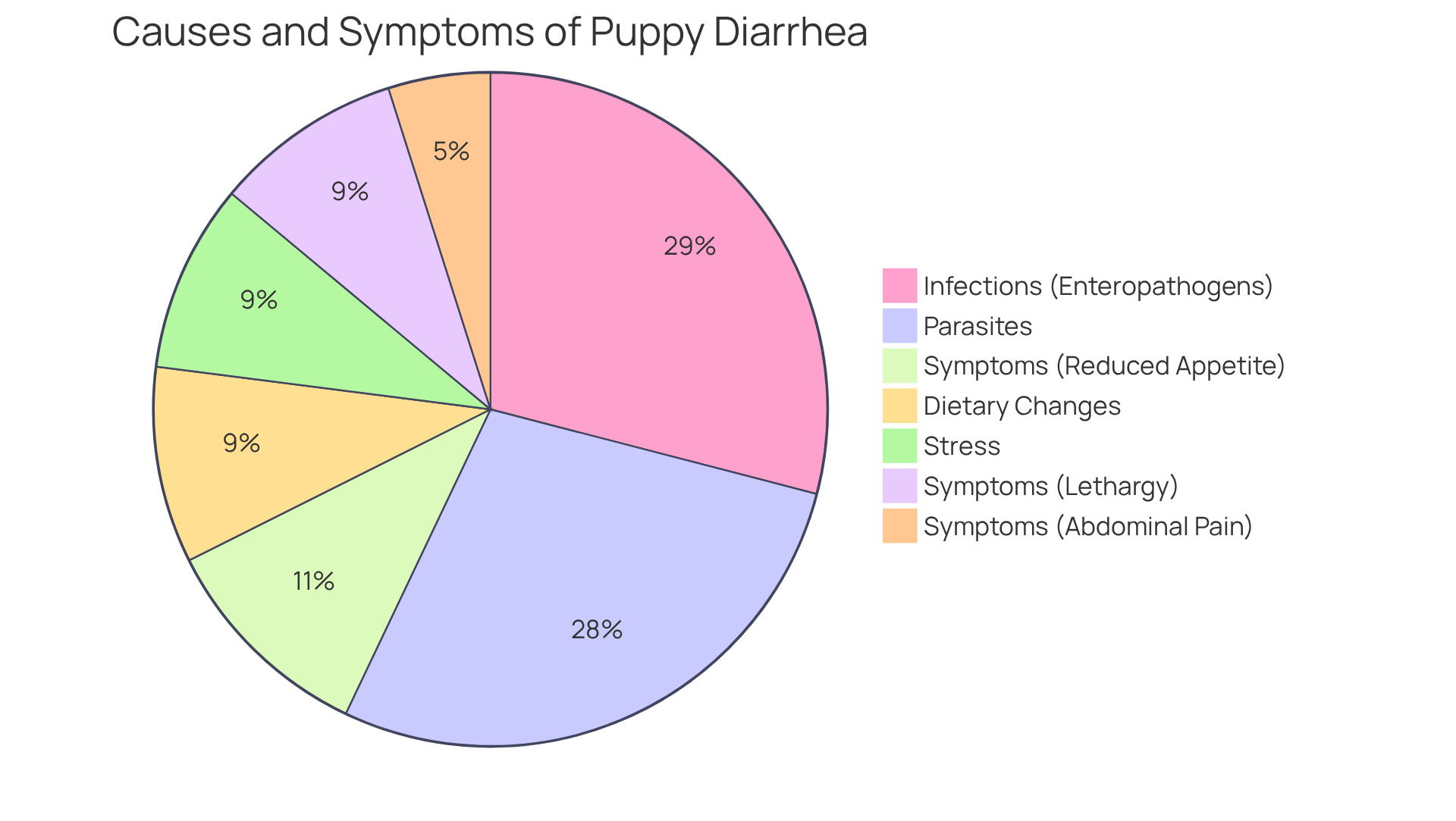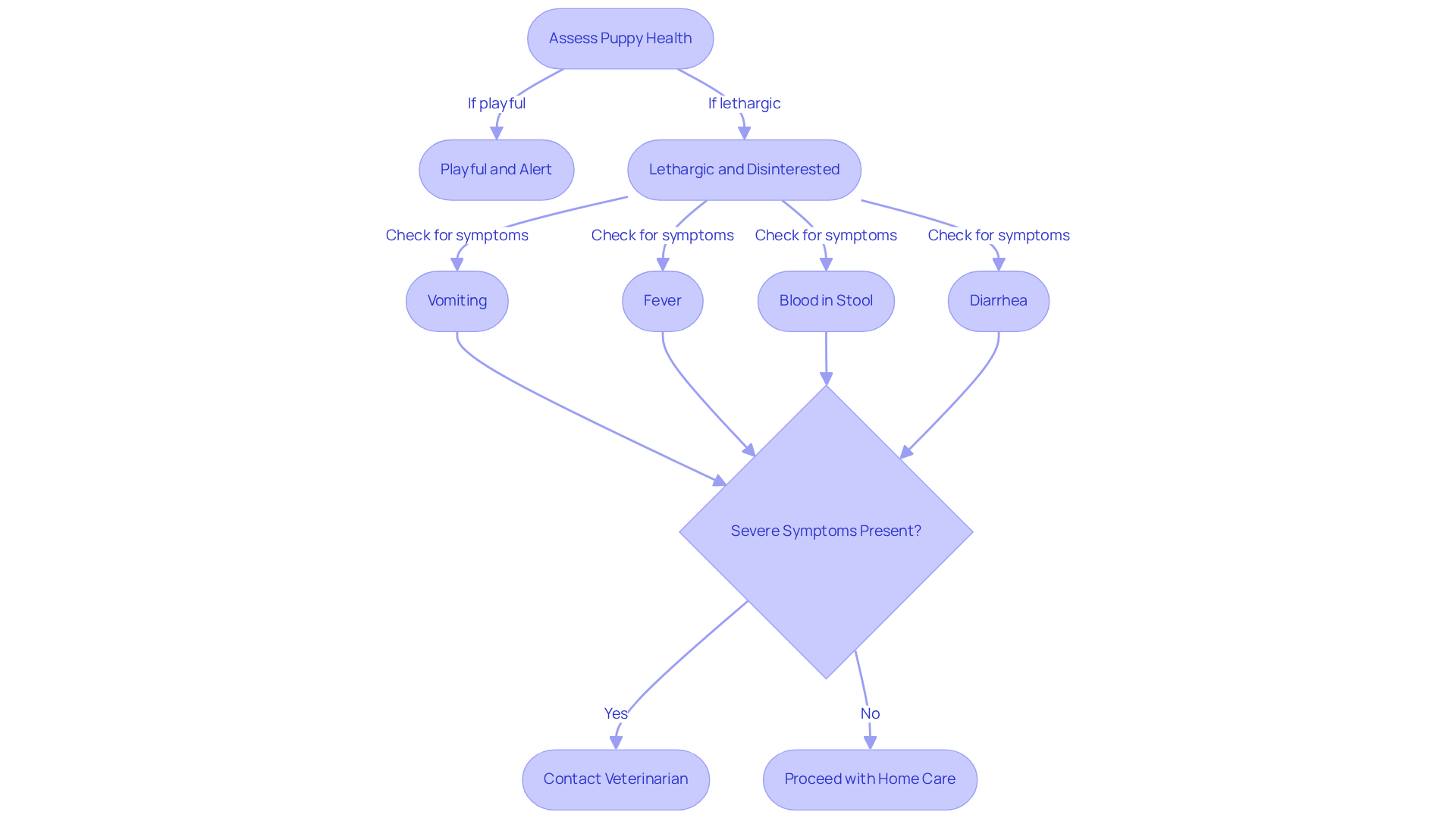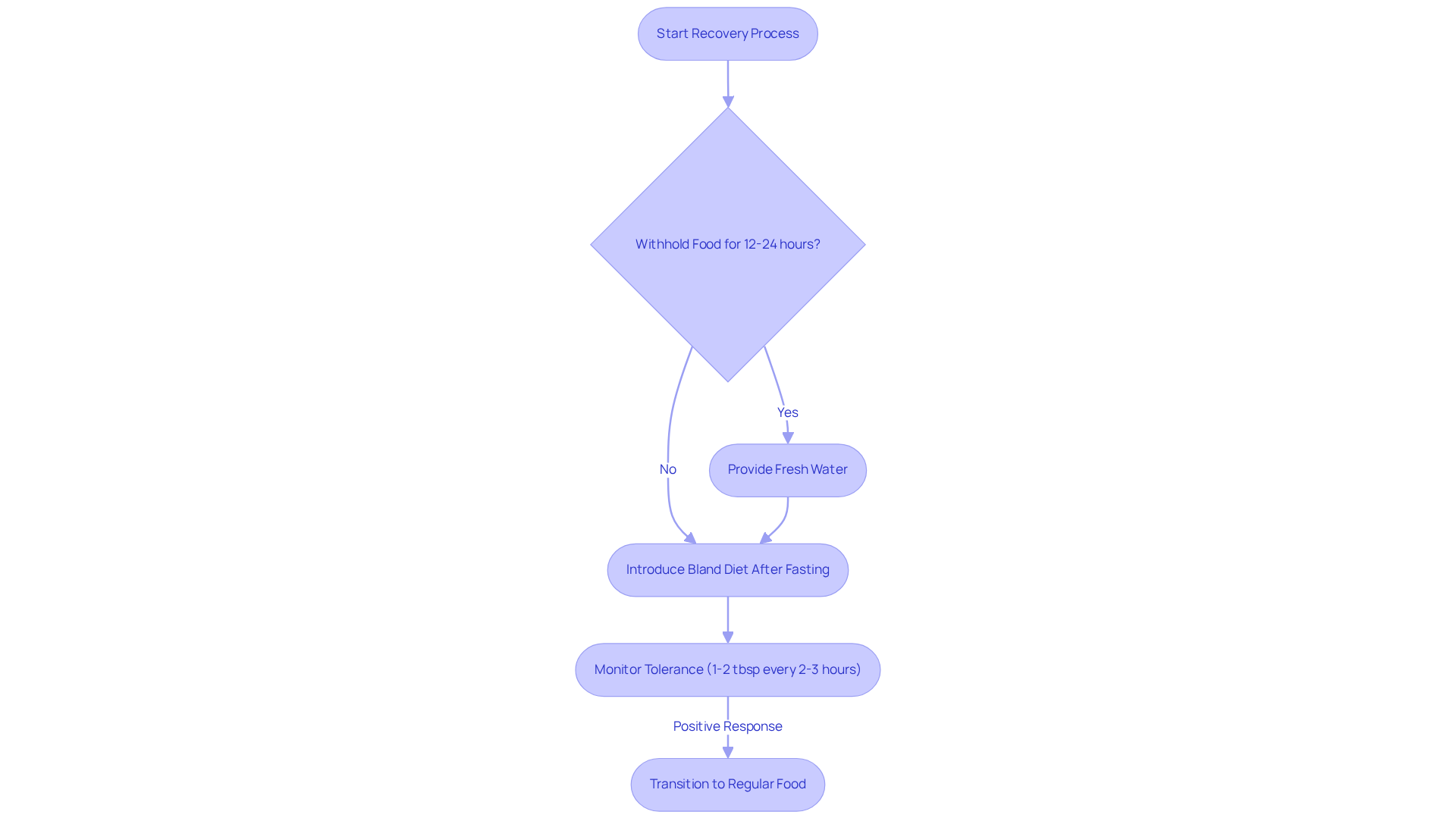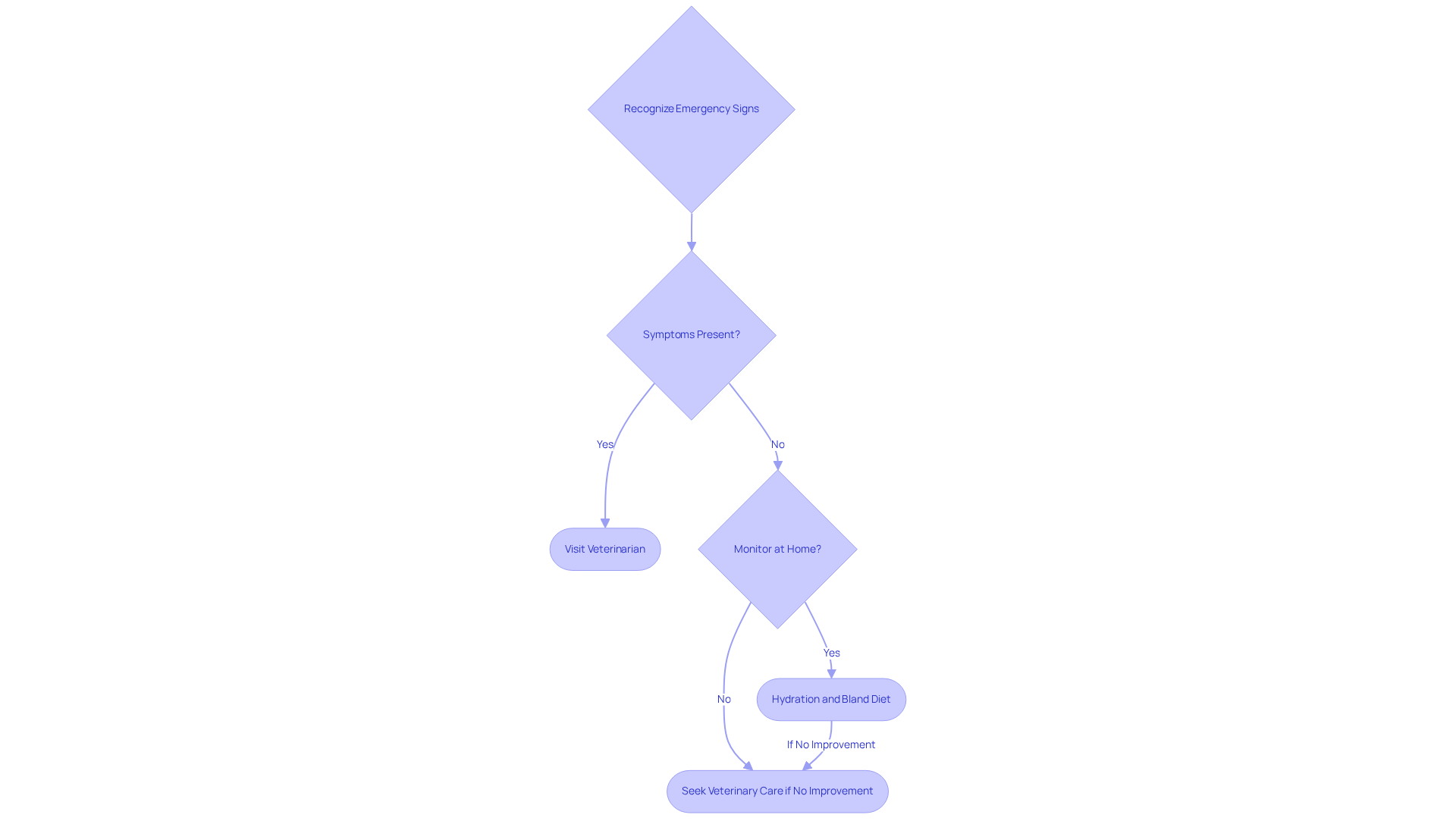
Puppy Diarrhea: Steps for Care and Recovery
Overview
Dealing with puppy diarrhea can be a distressing experience for pet owners, but it’s important to remember that effective management is within reach. By observing your puppy closely, making thoughtful dietary adjustments, and seeking veterinary help when needed, you can navigate this challenging situation with care. Monitoring symptoms and implementing a bland diet are not just practical steps; they reflect your deep concern for your puppy’s well-being. Recognizing signs that require immediate attention is also crucial, as it ensures your puppy receives the care they need promptly.
Many cases of puppy diarrhea can resolve with simple home care and the right guidance from your veterinarian. This journey can feel overwhelming, but you’re not alone. Many pet owners have faced similar challenges and found reassurance in the knowledge that they can help their furry companions recover. Remember, each step you take is a testament to your love and commitment to your puppy’s health. Embrace the support available, and rest assured that with attentive care, your puppy can return to their playful self soon.
Introduction
Dealing with puppy diarrhea can be a deeply distressing experience for both pets and their owners, often indicating underlying health issues that need careful attention. Many pet owners may feel overwhelmed, especially knowing that a significant number of young dogs face digestive troubles during weaning. Understanding the causes and symptoms is crucial for effective care, as it can help alleviate some of the worries that come with this situation.
How can you, as a devoted pet owner, navigate this challenging time to ensure your furry companion recovers swiftly and safely? This guide offers essential steps for assessing, managing, and treating puppy diarrhea, providing valuable insights into dietary adjustments and critical signs that signal when veterinary intervention is necessary. Together, we can ensure that your beloved pet gets the care they need during this difficult time.
Understand Puppy Diarrhea: Causes and Symptoms
Puppy diarrhea and other digestive issues can cause concern for pet owners, stemming from various factors such as dietary changes, infections, parasites, and stress. It’s important to know that recent studies indicate approximately 25% of young dogs experience puppy diarrhea during the weaning phase, with a concerning 77.1% of these puppies showing signs of enteropathogens. Symptoms can be distressing, including puppy diarrhea characterized by loose or watery stools, increased frequency of bowel movements, and signs of discomfort like whining, lethargy, or reduced appetite—affecting nearly 28% of dogs with these symptoms.
Monitoring your puppy’s behavior and stool consistency is essential in understanding the severity of puppy diarrhea. As veterinarian Aurélien Grellet wisely notes, “Prevention of weaning digestive issues requires both medical prophylaxis and implementation of management protocols designed to maintain health.”
If your puppy has diarrhea that persists for more than 24 hours or is accompanied by concerning signs like vomiting, abdominal pain, or lethargy—observed in 24% of cases—it may indicate a more serious issue that needs veterinary attention regarding puppy diarrhea. Thankfully, over 80% of diarrhea cases resolve with just one vet visit, offering reassurance to pet owners about the effectiveness of veterinary care.
Veterinary guidelines emphasize the importance of careful dietary management and vigilant monitoring for repeated episodes of puppy diarrhea, especially in young dogs, to ensure timely intervention and avoid complications. Remember, you’re not alone in this; your puppy’s health and happiness are top priorities, and there are compassionate solutions available to support you both.

Assess Your Puppy: Initial Steps to Take
Begin by closely observing your dog’s overall demeanor. Are they playful and alert, or do they seem lethargic and disinterested? It’s important to recognize any additional signs, such as:
- Vomiting
- Fever
- Blood in the stool
- Puppy diarrhea
Keeping a record of the frequency and consistency of their bowel movements is crucial for understanding their health, especially in cases of puppy diarrhea. If your young dog continues to drink water and consume small portions of food, you can proceed with home care. However, if they display severe indications of puppy diarrhea or show signs of dehydration—such as:
- Dry gums
- Sunken eyes
- Thick saliva
- Rapid breathing
It’s essential to contact your veterinarian promptly. Young dogs can be particularly vulnerable to health issues, and conditions like puppy diarrhea can lead to rapid dehydration, worsening their overall health. As Dr. Jerry Klein, Chief Veterinary Officer for the AKC, points out, signs of canine dehydration include loss of skin elasticity and lethargy. If your dog exhibits any of these symptoms, seeking prompt veterinary care is vital to ensure their well-being. Furthermore, keeping your dog current on vaccinations is essential to avoid common viruses that can result in dehydration. Remember, you are not alone in this journey; many pet owners share your concerns, and together we can ensure our furry companions receive the best care possible.

Implement Dietary Changes: Feeding Strategies for Recovery
When your young dog is recovering from puppy diarrhea, it’s important to approach their care with compassion and understanding. A bland diet of easily digestible foods can be a gentle way to help them heal. Consider starting with boiled chicken—without skin or seasoning—and plain white rice. To give their digestive system a chance to rest, it’s advisable to withhold food for 12 to 24 hours, ensuring that fresh water is always available. After this fasting period, you can gradually reintroduce small amounts of the bland diet every 2 to 3 hours, beginning with just one or two tablespoons to see how your puppy tolerates it.
If your puppy responds positively over the next couple of days, you can begin the reassuring process of transitioning back to their regular food. This can be done by mixing it with the bland diet over several days. Veterinarians often recommend maintaining a bland diet for 3 to 5 days after a mild gastrointestinal upset to help prevent puppy diarrhea. This gradual approach not only helps alleviate the digestive strain but also aligns with veterinary advice, which suggests that most dogs recover from mild digestive issues within a few days without needing extensive medical intervention.
In fact, studies show that 84% of puppy diarrhea cases seen by veterinarians are classified as mild, and many dogs improve significantly with just dietary adjustments. Additionally, probiotics have been effective in managing 60% of these cases, further supporting your dog’s recovery. Remember, you’re not alone in this journey; many pet owners face similar challenges, and together we can ensure our furry friends receive the best care possible.

Recognize Emergency Signs: When to Visit the Veterinarian
It’s important to stay vigilant for critical signs that may indicate your beloved dog requires immediate veterinary care. You might notice ongoing puppy diarrhea lasting more than 24 hours, as well as blood in the stool, severe lethargy, vomiting, or signs of dehydration such as dry gums, sunken eyes, and loss of skin elasticity. If your young dog shows any of these signs, please don’t hesitate to reach out to your veterinarian. Early intervention can make a significant difference, reducing the risk of serious health complications and promoting a quicker recovery for your furry friend.
Statistics reveal that vomiting and loose stools are among the top 10 reasons pets are taken to veterinarians for emergency care, underscoring the importance of recognizing these symptoms promptly. For instance, if a young dog experiences puppy diarrhea along with vomiting, this can lead to a heightened risk of dehydration, which may require intravenous fluids and supportive care to stabilize your pet. Remember, acting quickly can truly impact your dog’s health positively.
Additionally, if your puppy has diarrhea but is otherwise behaving normally, it may be appropriate to monitor your puppy at home. Over 80% of puppy diarrhea cases resolve with simple hydration and dietary changes. Trust your instincts as a pet owner; your attentiveness can be the key to ensuring your pet’s well-being.

Conclusion
Puppy diarrhea can be a distressing experience for both pets and their owners. Understanding its causes, symptoms, and appropriate care is crucial for navigating this challenging time. By recognizing the signs and knowing when to seek veterinary help, pet owners can ensure their puppies receive the necessary support during recovery. The emphasis on dietary management and vigilant monitoring reinforces the importance of proactive care in maintaining a puppy’s health.
Throughout this discussion, we’ve highlighted key points, including:
- The common causes of puppy diarrhea
- Critical symptoms to watch for
- Effective feeding strategies to aid recovery
The significance of timely intervention cannot be overstated; early recognition of severe symptoms can prevent serious health complications. Fortunately, the overwhelming majority of cases resolve with simple dietary adjustments and hydration, offering reassurance to concerned pet owners.
Ultimately, the well-being of a puppy is a shared responsibility between pet owners and veterinary professionals. By staying informed and attentive, pet owners can navigate the challenges of puppy diarrhea with confidence. Embracing a compassionate approach and seeking timely veterinary advice not only fosters a healthier recovery but also strengthens the bond between owner and pet. Every effort taken towards understanding and caring for a puppy’s health contributes to a happier, healthier life together.
